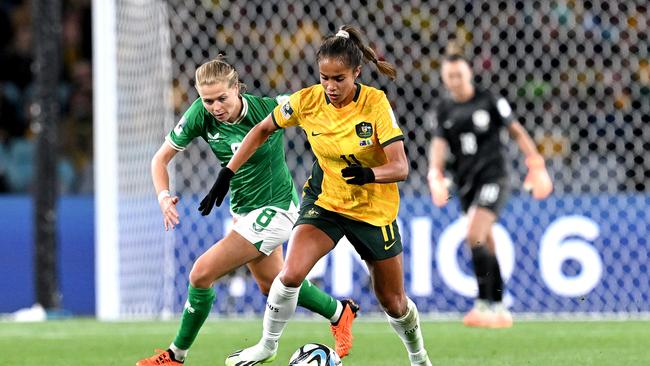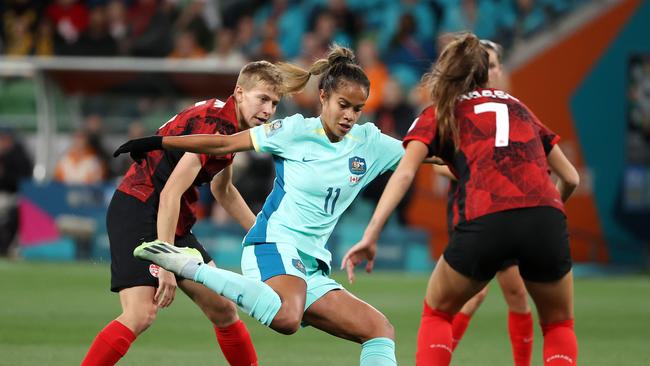Opportunity for all should be Matildas’ great legacy | Bruce Djite
As the Matildas prepare to face Denmark in what is the most anticipated sporting fixture in a generation – the legacy of this tournament must be examined, writes Bruce Djite.
Opinion
Don't miss out on the headlines from Opinion. Followed categories will be added to My News.
As the Matildas prepare to face Denmark in what is the most important and anticipated sporting fixture in a generation, it is a great time to reflect on what has been the most successful FIFA Women’s World Cup ever.
This FIFA Women’s World Cup has redefined standards, showcasing the significant role football plays not only in Australia but globally. Co-hosting this historic tournament has provided Australia the perfect platform to not only elevate women’s football, but all women and girls both locally and globally. It has shown the world that Australia is a real leader on the road to gender equality. This is something Football Australia and all Australians should be extremely proud of as the ripple effect of this World Cup’s success will be felt in every corner of the globe.

This is a landmark moment for the game and has further proven that the return on investment in women’s sport is material – women’s football is a clear outperformer.
More than 1.7 million tickets have already been sold and the highest rating match of the tournament was played right here at Hindmarsh Stadium in Adelaide between China PR and England – that match was watched by more than 54 million people. Channel 7’s most-watched program of the year is the Matildas final group game against Canada, which reached more than 4.7 million Australians. As we enter the knockout stage, this FIFA Women’s World Cup will continue to smash records.
Football is truly living up to its reputation as the world game and the sport that embraces everybody.
This tournament is uniting and inspiring people globally, and our very own CommBank Matildas are undoubtedly one of Australia’s most beloved national teams.
Signifying the team’s escalating popularity, Matildas jerseys are outselling the Socceroos two to one.
It is imperative that we continue to build on the success to date and continue championing women’s football.
So, how do we harness the success of the Matildas and this groundbreaking tournament? Ausplay data, produced by the Australian Sports Commission in 2022, affirms football as the top team participation sport, with more than 1.7 million registered players. Yet, despite this high level of participation, football infrastructure funding struggles to keep up. Following an impressive 10 per cent surge in club participation on the back of the 2022 FIFA Men’s World Cup in Qatar and an expected additional increase of 20 per cent after successfully hosting this FIFA Women’s World Cup, there must be an amplified sense of urgency from all levels of government to respond to this surge in participation.

The worst outcome or legacy of this tournament would be grassroots clubs turning young boys and girls away because they do not have the required infrastructure to accommodate the forecast surge in demand.
The Football Australia Legacy ‘23 report highlights the impacts, investments, and progress made during the first three years of an ambitious strategic plan, aimed at transforming the football landscape and leaving a positive legacy for future generations.
There is an urgent need to further improve stadium facilities, establish advanced infrastructure and drive transformation in community clubs. Yet the report uncovers challenges including a significant shortfall in female-friendly facilities, further underlining the need to invest in community infrastructure and high-performance programs.
Only 41 per cent of football facilities are classified as female-friendly, falling to 26 per cent in Tasmania and Western Australia. This means there’s a considerable gap in football-specific infrastructure across the 2400 clubs in Australia, necessitating urgent investment to meet the rising demand.
To ensure the continued success of football in Australia, and to support the increasing number of players inspired by events like the FIFA Women’s World Cup, governments at all levels must invest in football-specific infrastructure. This will help to bridge the current facilities gap, meet the anticipated surge in participation and ensure that football continues to flourish and thrive in Australia. It’s not just about infrastructure; it’s about a legacy of empowerment and community spirit.
Property Council members play a significant and crucial role in designing and delivering sporting infrastructure that facilitates the participation in sport, from grassroots changerooms and clubrooms to the elite sporting stadiums that so many of us frequent to experience the most memorable moments.
May this FIFA Women’s World Cup be a further catalyst, representation and proof of the benefits of gender equality. As a species we will never fulfil our potential unless women and girls are provided with equal opportunities and the requisite support that allows them to be included in all aspects of society. From access to education and sport to being able to participate in all forms of work, from unskilled labour to executive and board roles. We are all better off economically, socially and culturally by achieving an equal and equitable society.
Oh, and as for tonight’s Round of 16 match against Denmark, my prediction is a 2-1 win for our Matildas with Sam Kerr to score off the bench.
Bruce Djite is a former Socceroo and Adelaide United player and football director. He is now executive director of the Property Council of Australia (SA)





